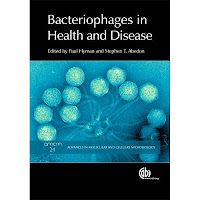Dr. Paul Hyman, Assistant Professor of Biology/Toxicology,
has edited Bacteriophages in Health and Disease with Dr. Stephen T. Abedon of the Ohio State University. This book has just been published by CAB
International. The various chapters,
including two chapters co-authored by Dr. Hyman, review the state-of-the-art in
the role of bacteriophages in disease development and development of new
therapies.
Bacteriophages, a type of virus that only infects bacterial
cells, are typically thought to have no effect on human health since they
cannot infect human cells. But they do have important roles in the evolution of
new pathogens by carrying genetic material between bacterial cells. There is also growing evidence that some
bacteriophages have evolved mechanisms to avoid the human immune system so that
they can attack bacteria that are part of the normal human microbiome – the
collection of microbes that are found on and in a healthy person – thus
altering the composition of the microbiome in ways that can also affect a
person’s health.
In addition, the book contains chapters
describing how bacteriophages are used in a variety of technologies for the
discovery of new drugs and vaccines as well as the detection and identification
of pathogenic bacteria. Some of these
are being marketed today including two anti-inflammatory drugs. The final chapters review the long history and
current study of bacteriophages as antibacterial drugs. In some countries bacteriophage have been
used for over 80 years to treat intestinal infections and wound infections
among others. This use of bacteriophages
is designated phage therapy. With the
increasing levels of antibiotic resistant bacteria being seen around the world,
phage therapy is seeing a resurgence in interest with dozens of treatments
undergoing clinical trial.
Tuesday, October 16, 2012
Microbiology professor edits a new book on bacteriophages
Labels:
biology,
faculty news,
publications,
research news
Subscribe to:
Post Comments (Atom)



No comments:
Post a Comment